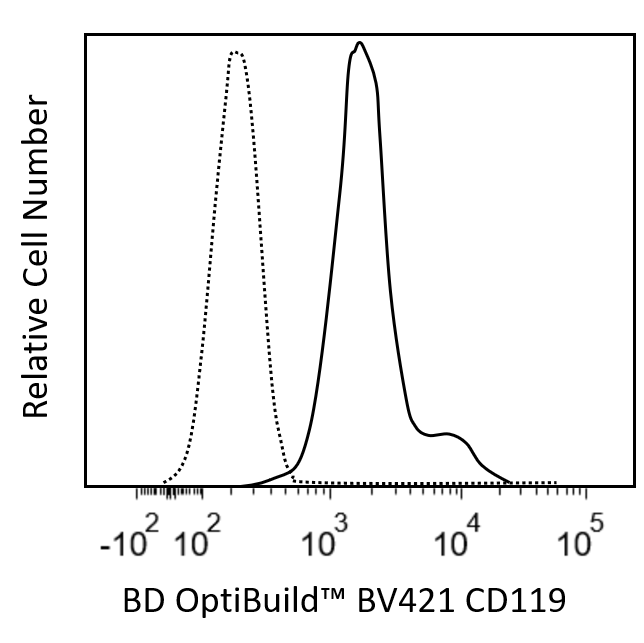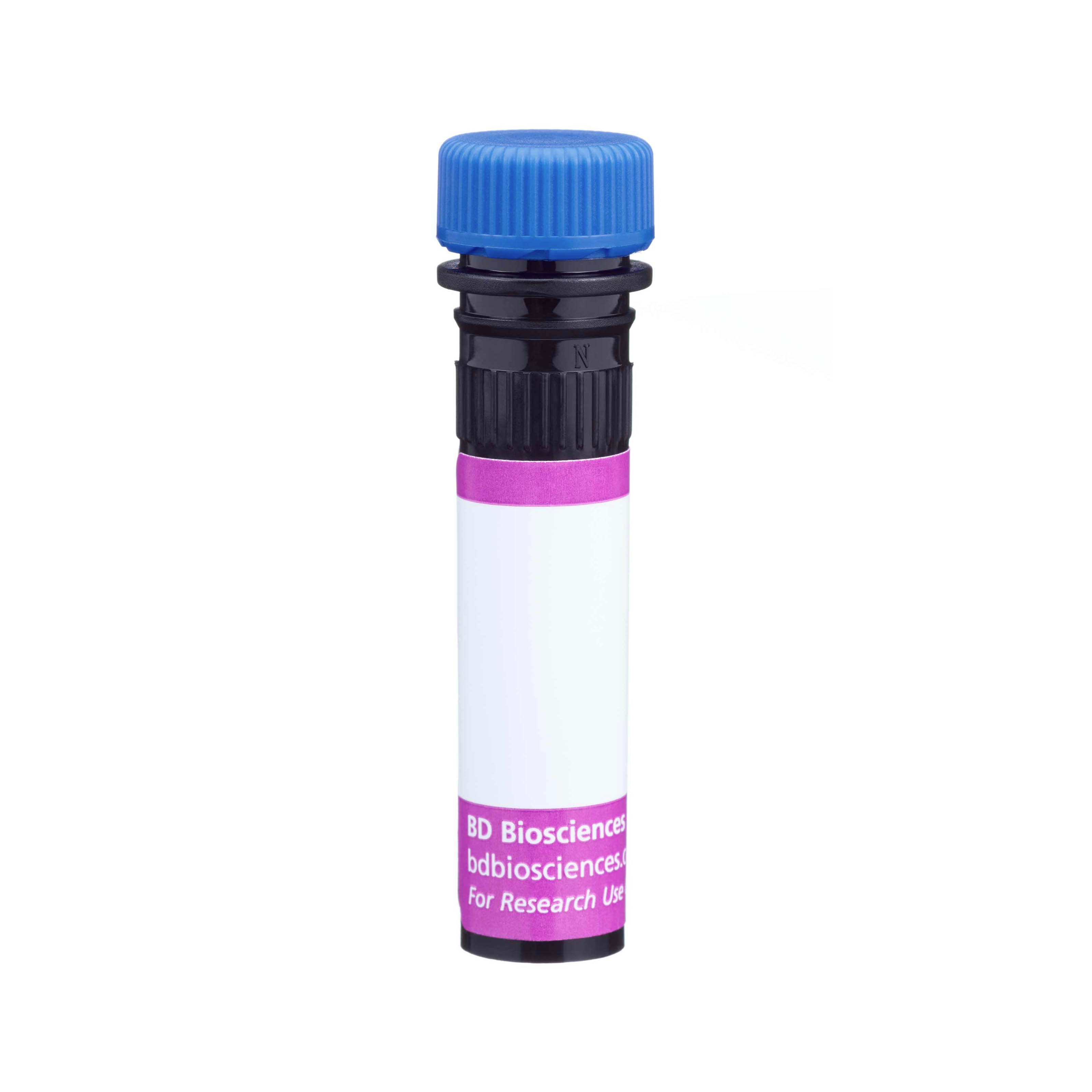Old Browser
This page has been recently translated and is available in French now.
Looks like you're visiting us from {countryName}.
Would you like to stay on the current country site or be switched to your country?




Flow cytometric analysis using BD OptiBuild™ BV421 Rat Anti-Mouse CD119 antibody (Cat. No. 740032; solid line histogram) on mouse splenocytes, with Isotype Control (dotted line histogram). Flow cytometry was performed using a BD LSRFortessa™ X-20 Flow Cytometer System.


BD OptiBuild™ BV421 Rat Anti-Mouse CD119

Regulatory Status Legend
Any use of products other than the permitted use without the express written authorization of Becton, Dickinson and Company is strictly prohibited.
Preparation And Storage
Recommended Assay Procedures
For optimal and reproducible results, BD Horizon Brilliant Stain Buffer should be used anytime two or more BD Horizon Brilliant dyes (including BD OptiBuild Brilliant reagents) are used in the same experiment. Fluorescent dye interactions may cause staining artifacts which may affect data interpretation. The BD Horizon Brilliant Stain Buffer was designed to minimize these interactions. More information can be found in the Technical Data Sheet of the BD Horizon Brilliant Stain Buffer (Cat. No. 563794).
Product Notices
- This antibody was developed for use in flow cytometry.
- The production process underwent stringent testing and validation to assure that it generates a high-quality conjugate with consistent performance and specific binding activity. However, verification testing has not been performed on all conjugate lots.
- Researchers should determine the optimal concentration of this reagent for their individual applications.
- An isotype control should be used at the same concentration as the antibody of interest.
- Caution: Sodium azide yields highly toxic hydrazoic acid under acidic conditions. Dilute azide compounds in running water before discarding to avoid accumulation of potentially explosive deposits in plumbing.
- For fluorochrome spectra and suitable instrument settings, please refer to our Multicolor Flow Cytometry web page at www.bdbiosciences.com/colors.
- Please refer to www.bdbiosciences.com/us/s/resources for technical protocols.
- BD Horizon Brilliant Stain Buffer is covered by one or more of the following US patents: 8,110,673; 8,158,444; 8,575,303; 8,354,239.
- BD Horizon Brilliant Violet 421 is covered by one or more of the following US patents: 8,158,444; 8,362,193; 8,575,303; 8,354,239.
- Pacific Blue™ is a trademark of Molecular Probes, Inc., Eugene, OR.
Companion Products






The GR20 monoclonal antibody specifically binds to CD119, the α chain of the interferon γ (IFN-γ) receptor. This receptor is expressed by mouse leukocytes, endothelial, and epithelial cells, but not by mature erythrocytes. GR20 mAb recognizes an epitope (susceptible to certain fixatives) in the ligand-binding site of the receptor. It can block the binding of mouse IFN-γ; therefore, it can inhibit IFN-γ .mediated effects including the activation of mouse macrophages for tumor cell killing. IFN-γ has been reported to induce the expression of Ly-6A/E antigen on cell lines and normal B lymphocytes, and the GR20 antibody is capable of inhibiting the IFN-γ.induced expression of Ly-6A/E on the mouse B lymphoma line A20. The binding of the GR20 antibody to CD119 is inhibited by IFN-γ. This antibody reportedly does not have any agonist effect.
The antibody was conjugated to BD Horizon™ BV421 which is part of the BD Horizon Brilliant™ Violet family of dyes. With an Ex Max of 407-nm and Em Max at 421-nm, BD Horizon BV421 can be excited by the violet laser and detected in the standard Pacific Blue™ filter set (eg, 450/50-nm filter). BD Horizon BV421 conjugates are very bright, often exhibiting a 10 fold improvement in brightness compared to Pacific Blue conjugates.

Development References (4)
-
Basu M, Pace JL, Pinson DM, Hayes MP, Trotta PP, Russell SW. Purification and partial characterization of a receptor protein for mouse interferon gamma. Proc Natl Acad Sci U S A. 1988; 85(17):6282-6286. (Immunogen). View Reference
-
Codias EK, Malek TR. Regulation of B lymphocyte responses to IL-4 and IFN-gamma by activation through Ly-6A/E molecules. J Immunol. 1990; 144(6):2197-2204. (Biology). View Reference
-
Cofano F, Moore SK, Tanaka S, Yuhki N, Landolfo S, Appella E. Affinity purification, peptide analysis, and cDNA sequence of the mouse interferon gamma receptor. J Biol Chem. 1990; 265(7):4064-4071. (Biology). View Reference
-
LeClaire RD, Basu M, Pinson DM, et al. Characterization and use of monoclonal and polyclonal antibodies against the mouse interferon-gamma receptor.. J Leukoc Biol. 1992; 51(5):507-16. (Biology). View Reference
Please refer to Support Documents for Quality Certificates
Global - Refer to manufacturer's instructions for use and related User Manuals and Technical data sheets before using this products as described
Comparisons, where applicable, are made against older BD Technology, manual methods or are general performance claims. Comparisons are not made against non-BD technologies, unless otherwise noted.
For Research Use Only. Not for use in diagnostic or therapeutic procedures.
Report a Site Issue
This form is intended to help us improve our website experience. For other support, please visit our Contact Us page.